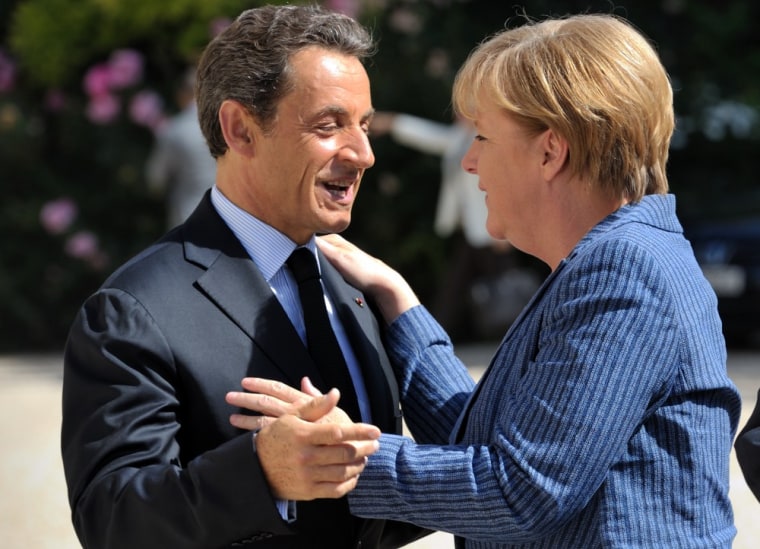Leaders of France and Germany offered fresh proposals to solve a widening debt crisis Tuesday, but the announcement did little to restore confidence and reverse the widening impact on U.S. consumers, investors and policymakers.
French President Nicolas Sarkozy and German Chancellor Angela Merkel emerged from the latest round of talks to urge all 17 nations that use the euro to rewrite their constitutions to require balanced budgets and to form a "true European economic government."
Sarkozy and Merkel presented their proposals after meeting in Paris as fresh evidence of economic slowdown in Europe added to apprehensions about a renewed global financial crisis.
"This does not seem to be a game-changer or a show-stopper," said Mohamed El-Erian, co-chief investment officer of PIMCO, a giant bond fund. "I also am not sure how much support it will get."
Until European leaders agree on a unified plan, business leaders and investors face continued uncertainty about the viability of the euro, one of the world’s most important currencies. U.S. bankers worry about the possible failure of one or more of their European counterparties. Investors have dumped stocks and poured money into gold until they see clearer signs of a solution to the Eurozone’s ongoing struggle to restructure the crushing debt of weaker members.
“There are all kinds of challenges around the sovereign debt there, and that has made businesses hesitant,” President Barack Obama told a town hall meeting at the Seed Savers Exchange in Decorah, Iowa, Monday. “Some of the effects of Europe have lapped onto our shores.”
The European debt stalemate is also threatening to further slow the global economy. Europe's gross domestic product grew by just 0.2 percent in the latest quarter, down from 0.8 percent in the first quarter, according to a report released Tuesday.
Germany and France, the continent's two biggest economies, barely expanded at all in the second quarter.
Already Europeans are at loggerheads in part over Germany’s refusal to finance a bailout of weaker countries. Now with Germany's GDP barely growing, aid for weaker countries could become an even tougher sell politically.
"While German politicians are currently racking their brains on the pros and cons of common euro bonds, the luxury of having an economy running at "wonder" speed is fading away," said Carsten Brzeski, a senior economist at ING in Brussels.
Germany's mass-circulation Bild newspaper warned German chancellor Angela Merkel Tuesday not to cede on the issue of euro bonds.
"Euro bonds would ultimately make Germany the paymaster of Europe," the newspaper said in an editorial. "The government must stick to its NO on euro bonds. All the debt sinners must clearly sort themselves out once and for all."
Fears of a global economic slowdown also have weighed on consumer confidence in the U.S., further weakening growth at home.
Europe’s debt stalemate and sluggish economy have sent stock market investors looking for cover, whipsawing investors over the past two weeks. Fears that the debt crisis is spreading to the continent's core prompted investors last week to dump shares in French banks, which are exposed to Italian debt. Rumors have circulated -- denied by rating agencies -- that France's top-notch AAA rating could be at risk.
"The markets are exhausted by the euro zone debt crisis," Nick Beecroft, senior markets consultant at Saxo Bank, told CNBC.
U.S. stocks dropped more than 1 percent and the euro slid as the proposals failed to ease worries about a debt crisis that global investors fear is spreading from weaker countries on the edges of the Eurozone to larger eocnmnies like Italy and France.
So far, the main response to the overhang of European debt has been a series of budget cuts — with pledges of deeper cuts to come. Those cuts — along with sagging confidence among European consumers — have taken a major toll on the European growth.
“While Greece, Ireland, Portugal, Spain and Italy have to take the strongest action to improve their public finances, other countries have also come under serious pressure to bite the (budget) bullet harder, including France,” said Global Insight Economist Raj Badiani in a note to clients Tuesday.
Those budget cuts are a preamble to the coming deficit reduction in the U.S., where lawmakers are only beginning to identify where the budget axe will fall. The last-minute deal between Congress and the White House postponed decisions on some $1.5 trillion in cuts until year-end.
But European leaders, including Merkel and French president Nicolas Sarkozy, are under more immediate pressure to show financial markets they are in agreement on doing more to shore up the embattled currency union — or risk watching the euro zone unravel.
The lack of a central tax and spending policy lies at the root of Europe’s current crisis. Because there is no central government or single European Treasury, member countries have set their own budgets and issued their own bonds to make up any shortfall.
Many experts believe the only way to ensure affordable financing for the bloc's most financially distressed countries would be to issue euro bonds jointly. But doing so would raise borrowing costs for countries with lower debt burdens like Germany.
